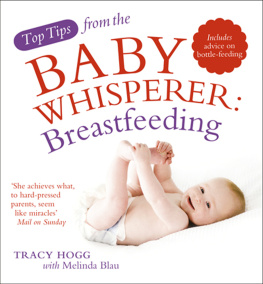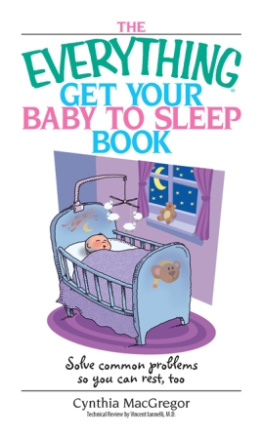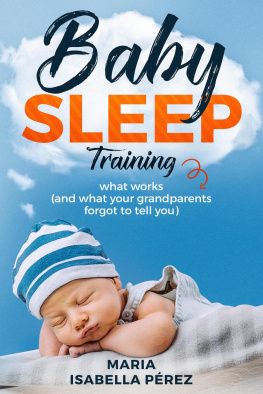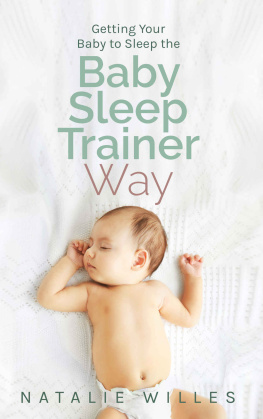Contents
Sleep:
Top Tips
from the
Baby Whisperer


A Division of Simon & Schuster, Inc.
1230 Avenue of the Americas
New York, NY 10020
www.SimonandSchuster.com
Copyright 2005 by Tracy Hogg and Melinda Blau
All rights reserved, including the right to reproduce this book or portions thereof in any form whatsoever. For information address Atria Books Subsidiary Rights Department, 1230 Avenue of the Americas, New York, NY 10020.
First Atria Books ebook edition July 2011
ATRIA BOOKS and colophon are trademarks of Simon & Schuster, Inc.
The Simon & Schuster Speakers Bureau can bring authors to your live event. For more information or to book an event, contact the Simon & Schuster Speakers Bureau at 1-866-248-3049 or to visit our Web site at www.simonspeakers.com .
Manufactured in the United States of America
10 9 8 7 6 5 4 3 2 1
ISBN 978-1-45165-572-8 (ebook)
Text previously published in The Baby Whisperer Solves All Your Problems.
The information given in this book should not be treated as a substitute for qualified medical advice; always consult a medical practitioner. Neither the authors nor the publisher can be held responsible for any loss or claim arising out of the use, or misuse, of the suggestions made or the failure to take medical advice.
Introduction
I have always been proud of my ability to help parents understand and care for their young children and I feel honored whenever a family asks me into its life. During this time, on my Web site and in my e-mail in-box, Ive been inundated with requests for help, often on the subject of sleep. Maybe youre trying to get your baby on a structured routine to teach him to sleep better, or maybe your toddler is beginning to have sleep problems, but youre not sure what to do or even if the same principles apply to eight-month-olds as to newborns. When parents come to me with a particular challenge, I always ask at least one question, if not a string of them, about both the child and what parents have done so far in response to their situation. Then I can come up with a proper plan of action. My goal is to help you understand my thought process and get you in the habit of asking questions for yourself.
Tuning In
Baby whispering begins by observing, respecting, and communicating with your babyobserving body language, listening to cries, slowing down so that you can really figure out whats going on. It means that you see your childs personality and particular quirksand you tailor your parenting strategies accordingly.
Why doesnt it work? is by far one of the most common questions parents ask. Whether a mom is trying to get her infant to sleep more than two hours at a time or her toddler to nap properly, I often hear the old yes, but response: Yes, I know you told me I have to wake her during the day in order for her to sleep at night, but Yes, I know you told me it will take time, but
Granted, I know that some babies are more challenging than othersjust like adultsbut my baby whispering techniques do work; Ive used them myself with thousands of babies.
When problems persist, its usually because of something the parents have done, so you need to ask yourself if one of the following statements applies to you:
). You start, ideally, from the day you bring your little bundle home from the hospital. You could also introduce a routine later, but the older the baby, the more trouble parents often have.
Youve been doing accidental parenting. Unfortunately, in the heat of the moment parents sometimes do anything to make their baby stop crying or to get a toddler to calm down. Often, the anythingwhether walking, rocking, or jigglingturns into a bad habit that they later have to breakand thats accidental parenting.
Youre not reading your childs cues. He used to be on schedule, and now hes not. How do I get him back on track? When I hear any version of that phraseused to be and now is notit usually means theyre paying more attention to the clock (or their own needs) than the baby himself.
Youre not factoring in that young children change constantly. I also hear the used to be phrase when parents dont realize that its time to make a shift; the only constant in the job of parenting is change.
Youre looking for an easy fix. The older a child is, the harder it is to break a bad habit caused by accidental parenting. Be patient.
Youre not really committed to change. If youre trying to solve a problem, you have to want it solvedand have the determination and stamina to see it through to the end. If we stick with it, children do get used to the new way.
Parents sometimes delude themselves. They will insist that theyve been trying a particular technique for two weeks and say its not working. Often theyve tried for three or four days, and it worked, but a few days later they didnt follow through with the original plan. The poor child is then confused.
If youre not going to see something through, dont do it. If you cant do it on your own, enlist backup people.
Youre trying something that doesnt work for your family or your personality. If youre not comfortable doing a particular technique, either dont do it or find ways to bolster yourself, by having the stronger parent take over for a bit, or enlisting a relative or a good friend to help.
It aint brokeand you dont really need to fix it. Babies are individuals. Your baby may be sleeping less than another baby or have a smaller-than-average build. If it isnt a concern to your doctor, just observe your child.
You have unrealistic expectations. Babies do sometimes need to feed in the night. Children require care, constant vigilance, and lots of loving time.
Im not a big fan of age charts and never have been. Babies challenges cant be sorted into neat piles. Still, I have broken down my advice and tailored various techniques according to age groupings to give you a better understanding of how your child thinks and sees the world. I urge you to read all the stages, because earlier problems can persist, or your child might be more advanced in a particular area.
Where We Go from Here
You can read this book cover to cover, or just look up the problems youre concerned about and go from there. However, I strongly recommend that you at least read through
CHAPTER ONE
E.A.S.Y. Isnt Necessarily Easy (But It Works!)
Getting Your Baby on a Structured Routine
The Gift of E.A.S.Y.
You probably have a routine in the morning. You get up at roughly the same time every day, maybe you shower first or have your coffee, or perhaps you take your dog out for a brisk walk. Whatever you do, its probably pretty much the same every morning. If by chance something interrupts that routine, it can throw off your whole day. Human beings thrive when they know how and when their needs are going to be met and whats coming next.
Well, that includes babies and young children. When a new mom brings her baby home from the hospital, I suggest a structured routine straightaway. I call it E.A.S.Y., an acronym that stands for a predictable sequence of events that pretty much mirrors how adults live their lives, albeit in shorter chunks:











